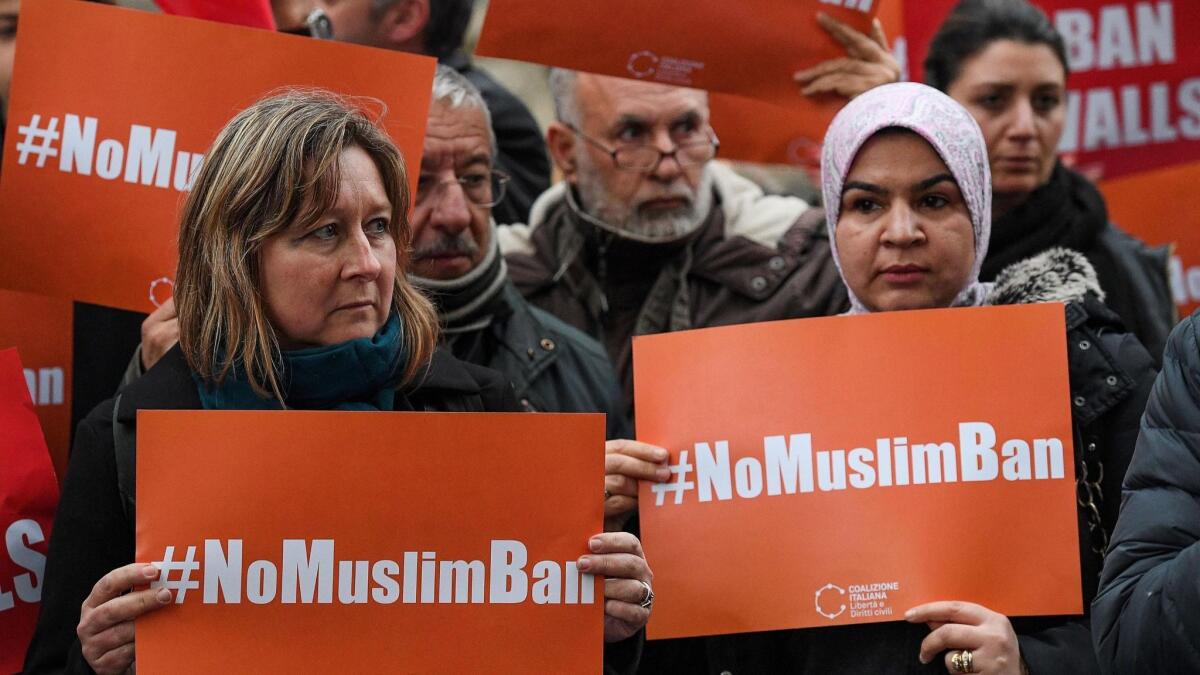Op-Ed: Dear Americans: Trump’s travel ban is an outrage, but we’re used to it

- Share via
President Trump’s so-called Muslim ban sparked the first major policy-related protests of his tenure. Like many others, I was outraged. But I was also worried on a more personal level. For the first chaotic 48 hours, it seemed that his executive order would affect all citizens of seven Muslim-majority countries, including dual citizens. That is to say, it would include me. Although I have lived in New York for 13 years on a series of student and work visas, I carry Canadian, Swiss and — the culprit — Iranian passports.
Immediately I moved to cancel longstanding vacation plans, for which the airlines, by the way, charged me a fee. One week later, it looks as though I can pass safely across borders, after all — the Trump administration keeps releasing contradictory information — but my lawyer is still cautioning against international travel, just to be safe.
With so many facing actual hardship — refugees turned away, families separated, travelers stranded — it would be obscene to complain about my deferred vacation. My American friends, however, are incensed that I face any travel limitations whatsoever. In fact, they seem a lot more upset than I am. The kind, supportive messages they’ve sent my way speak to the best of American values, even as they expose the naiveté that comes with a lifetime of passport privilege.
Let me be blunt for a moment. People from countries with “bad” passports are used to this. They live with it. They plan their lives and their children’s lives around it, sometimes from conception.
The groundwork for Trump’s order was laid long before he was the Republican nominee.
My mother gave birth to me in Canada precisely so that I could, as a citizen of a liberal, wealthy, Western country, avoid a lifetime of visas as an Iranian. I will likely continue to enjoy that privilege — Canadians of all backgrounds appear to be exempt from the ban — but the fact remains that many people in the world don’t have the legal right to travel freely, let alone the means to fly halfway across the world to exercise that right.
Obtaining papers to enter the United States as a citizen of Iraq, Iran, or any other country that’s not part of the Visa Waiver Program often involves long waits, onerous paperwork and in-person interviews. This was the case before President Trump signed his executive order.
Anyone with relatives in Africa, South Asia or the Middle East knows the drill. Unrestricted travel and protection from discrimination, particularly when traveling to and from the United States, was never the norm. I’m used to seeing people close to me avoid or cancel international travel because their country’s leader doesn’t see eye to eye with another country’s leader.
My mother, a dual citizen of Iran and Switzerland who has lived in Geneva for decades, had to change plans to visit me because of HR-158, a law passed by Congress last winter that requires all Iranians to obtain visas regardless of dual citizenship. From my vantage point, the groundwork for Trump’s order was laid long before he was the Republican nominee.
An industry has even cropped up to help wealthy people with “bad” passports get around the problem by buying a new passport from the half dozen countries that sell them. It’s not uncommon for a Russian oligarch living in London to have Maltese citizenship, or for a Chinese investor to carry a passport from a Caribbean tax haven such as Antigua or Grenada.
Indeed, the very contours of citizenship in the 21st century — who gets access to it, how it’s obtained — speak to global inequality and the shifting nature of national allegiances. This much is clear when the tech investor and Trump advisor Peter Thiel is able to procure citizenship to New Zealand despite not meeting the country’s residency requirements. When we put a price tag on passports, what does nationality mean? If you have two citizenships, whose side are you on?
Such fluidity is part of what nationalist politicians are reacting to when they institute xenophobic bans. They don’t recognize their country, or the people in it. But returning to an outdated idea of citizenship won’t get them very far.
Trump’s executive order has now made entering the United States even more difficult, both for international tourists who hope to travel here, and for those who hope to live here, some of whom have already put in the significant time and effort to do so legally. It pays no heed to the lives it touches. If the order stands, a large number of foreign citizens who are already living in the U.S. legally will get a taste of the undocumented life and learn firsthand what it means to be unwanted, disrespected, and unable to leave without fear of deportation.
In the coming months, the courts will test the limits of the executive order, and the American people will test the reach of the courts. If anything positive can come of this fiasco, it’s that ordinary Americans — the natural-born citizens who’ve long taken their freedom of movement for granted — will begin to understand that, in our world, the mobility they enjoy is a privilege, not a right.
Atossa Araxia Abrahamian (@atossaaraxia) is a journalist and the author of “The Cosmopolites: The Coming of the Global Citizen.”
Follow the Opinion section on Twitter @latimesopinion or Facebook
More to Read
A cure for the common opinion
Get thought-provoking perspectives with our weekly newsletter.
You may occasionally receive promotional content from the Los Angeles Times.










